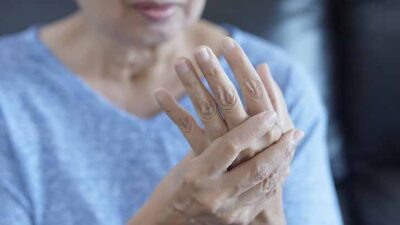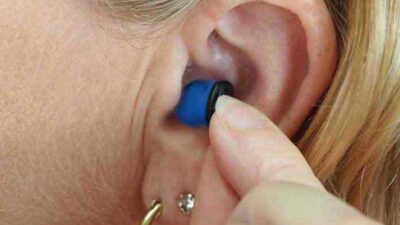Arthritis can mess up your life; that’s sad but true. Ask an arthritis patient, and he/she will tell you how the pain can take a toll on life.
Pain prevents an arthritis patient from undertaking routine work with ease, makes him/her dependent on others for body movement, and requires them to expend a lot more energy than healthy humans even to complete basic life tasks.
Apart from this, arthritis can also lead to, or aggravate pre-existing sleep disorders. Patients of arthritis often find themselves struggling with a range of sleep problems, snoring included[1].
Pain and Insomnia Feed Off Each Other

Osteoarthritis has been clinically proven to keep people awake at night, because of the pain. Almost 70% of patients of osteoarthritis also have some or the other sleep disturbance.
From trouble falling asleep to trouble staying asleep – these sleep disturbances wrack havoc with your sleep patterns. Pain prevents your body from feeling comfortable enough to fall asleep. And, in many cases, pain causes you to wake up even if you fall asleep.
Pain catastrophizing is an important concept to be understood here. Patients of arthritis often lie in bed, thinking that their pain will get worse, or will never get any better. This catastrophizing becomes another contributor to sleep disturbances.
Lack of sleep, then, means that your body is less prepared to combat the pain of the next day. Lack of sleep, in fact, could lead to a phenomenon called central nervous system sensitization. This mean that your pain pathways become more excited than their normal state.
This in turn causes the pain perception to be heightened way beyond the typical amount of damage observed in an arthritis patient’s joints.
Poor and inadequate sleep, eventually, aggravates the problem of the patient, making him/her more vulnerable to more illnesses and diseases. Also, the lack of proper sleep itself can become a cause for more sleep-related disorders, the most common of them being snoring[2].
Arthritis and Snoring – How to Tackle the Problem?

Understandably, arthritis patients often don’t discuss their sleep problems, such as snoring, with their doctors. Considering how a good night’s sleep is important for your body to respond to arthritis pain well, it’s crucial you pay heed to your snoring problem (even though it seems innocuous as compared to the joint pain).
For starters, your doctor will help you isolate the most troublesome sleep problem, so that you can attack it first, and get the maximum benefit out of treatments and remedies. Invariably, the key sleep problem among arthritis patients turns out to be snoring.
Your doctor will be able to suggest simple remedies and alterations to your sleep behaviour that will help you sleep more and snore less. But to eliminate this completely, one can go for snoring devices and aids which are available all over the internet.
Adopt a Regular Sleep Schedule
Whether it’s arthritis pain only, or the perfect disaster of joint pain and snoring coming together to spoil your night sleep, regularity is a solution. Look to sleep at the same hour, and wake at a fixed hour, all 7 days of the week.
The habit of ‘making up for lost sleep’ on Saturday won’t help at all. Instead, look to set a schedule, and follow it strictly. This helps develop a sort of internal body snooze mechanism, which enables you to sleep better, combat snoring, and ignore the persistent pain.
Power Off Electronic Gadgets
It can be tempting to seek refuge in the world of Internet when sleep seems far off. However, it’s been proven that the blue light from electronic device screens interferes with the brain’s ability to ‘switch off’ and cause your body to sleep naturally. So, make it a point to not use your smartphones and tablets after at least 2 hours prior to your sleep time.
In an experiment, campers who let go of their electronic devices for a week easily tuned their sleep cycles to the sun! This, in turn, helps you sleep as per a schedule, and keeps snoring, as well as insomnia-aggravated joint pain at bay.

No Alcohol, No Caffeine, No Smoking
Your morning cup of coffee is harmless, no worries. However, any amounts of caffeine consumed after the afternoon are very likely to interfere with your sleep. Many dieticians and physicians swear by the positive effect of giving up the cup of pre-sleep coffee on having snoring-free sleep.
Replace caffeine with other beverages such as herbal teas. Apart from caffeine, you also need to get rid of alcohol and tobacco from your lifestyle.
When you drink or smoke after evening, your throat becomes exceptionally relaxed, which reduces the width of the effective air passage inside the throat. This instigates and aggravates snoring.
Read Next – What are the Common Causes of Arthritis
Other Remedies to Combat Arthritis and Its Associated Sleep Disorders
Apart from the remedies suggested above, here are some more to try out:
- Do not eat fat-rich foods after evening
- Take up light exercises and target at least 150 minutes of strenuous exercise per week
- Adopt de-stressing practices – meditation will help you heal physically as well as psychologically
- Sleep on your side; sleeping on your back
Concluding Thoughts
Sleeping well is a major aid to your arthritis problem, and to that effect, it’s time you take measures to combat snoring.
Feature Image – shutterstock.com
In-Post image – signaturemd.com







 This article changed my life!
This article changed my life! This article was informative.
This article was informative. I have a medical question.
I have a medical question.
 This article contains incorrect information.
This article contains incorrect information. This article doesn’t have the information I’m looking for.
This article doesn’t have the information I’m looking for.